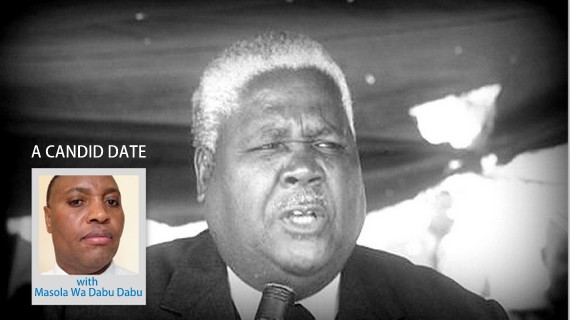
HOW time flies! Today is July 1 and Zimbabweans of all walks of life are reflecting on the late Joshua Mqabuko Nyongolo Nkomo’s contributions to the liberation of Zimbabwe.
Candid Date with Masola Wa Dabu Dabu
To pre-empt or thwart the vile intents of abominable politicians, the Nkomo family has encouraged the people to celebrate in his memory and implored political parties not to nefariously hijack the sensitivity of the occasion for political grandstanding.
The name Joshua Nkomo and politics will forever remain inseparable. As such, political parties, political commentators and political upstarts will want to be associated with the crumbs from the Nkomo cake of fame.
Thirteen years ago in July of 2000, yours truly penned a piece on President Robert Mugabe’s apparent display of sombreness and solemnity during the first annual memorial service in Nkomo’s honour. Ostensibly, the memorial was to celebrate the lifelong accomplishments of an iconic figure.
Agreeably, Nkomo’s death was a big loss for the country. Those who had suckled from Zapu’s udder of excellence were proud to have had Nkomo as their leader. The list of people who received tutelage from Zapu includes Mugabe, Emmerson Mnangagwa and yours truly, among others, and most continue to proudly celebrate Nkomo’s achievements. His death did not become a destructive distraction.
In the year 2000 — a year after Nkomo’s death — Mugabe attended the memorial service in mourning mode. His body language maintained a dignified show of loss. He cut a very worried and pained figure. One would have thought that some limb of his had been hacked off his body without the civility of an anaesthetic.
The memorial seemed to have been turned into a platform for mourning Zanu PF’s political misfortunes that followed Nkomo’s death. In all fairness, the memorial was supposed to reinforce the indelibility of his contributions towards a free Zimbabwe.
- Chamisa under fire over US$120K donation
- Mavhunga puts DeMbare into Chibuku quarterfinals
- Pension funds bet on Cabora Bassa oilfields
- Councils defy govt fire tender directive
Keep Reading
The preparatory stages of the memorial saw politico-religious quibbling. Mugabe threatened to boycott the service if the Nkomo family choice of the then Archbishop Pius Ncube of the Bulawayo diocese was retained. The family succumbed to the demands and pleasures of one man and the celibate Archbishop cum-Mugabe archenemy was removed as the celebrant.
Questions followed! Some politically-adventurous people asked why the proverbial bull fighter (Karigamombe) appeared to be sniveling in agony after the bull had been felled. Why in the name of politics did Mugabe feel partially incapacitated after God’s will had been done? Why did Mugabe feel more bereft than others due to Nkomo’s death? Why did Mugabe feel a personal loss at the demise of a man he had once loathed and despised so much during their political skirmishes?
Why did Mugabe howl loudest considering a stormy past with Nkomo? Was Nkomo really busy planting weapons of war at a time when Zanu PF members were frantically planting crops to feed the hungry? Why did Nkomo’s death worry Mugabe so much after he (Nkomo) had delivered the Matabeleland vote to Zanu PF on a bloodied platter? Why did it matter so much that a particular Catholic priest in cassock and chasuble did not dangle his pectoral cross and tippet in Mugabe’s vicinity during the first memorial service?
Maybe he was being genuine in expressing his inability to plug the void left by Nkomo’s death. Maybe he was subconsciously admitting that he was devoid of any ideas of reining in the restive Matabeleland province in the manner he and Nkomo had managed. Maybe he had come to the realisation that what they had cobbled together was not for the people, but a temporary ego-booster for politicians. Speculatively, Mugabe may have been solemnly expressing regret for admonishing, persecuting, insulting, deserting, ridiculing, demeaning, humiliating, larruping and lampooning the man who would eventually prove to be a sturdy shoulder to lean on.
If Mugabe had to write candid memoirs, perhaps he would express regrets that Nkomo could not live beyond the formation of the MDC. It would not be surprising if he wrote that Nkomo’s death, incidental or accidental, would have been more acceptable between 1982 and 1987. Of course, the elimination of Nkomo from the political arena at that time would have greatly aided Mugabe’s quest for total domination of Zimbabwe’s political arena.
He would have instituted a totalitarian one-party State with him as the life President. He would have offered sacrifices to his gods for enabling the subjugation of the people of Matabeleland through the decapitation of their head politician.
Nkomo’s death might have triggered a political storm for Mugabe’s Zanu PF. The nation saw the government losing on the referendum, white-owned farms were violently seized in pursuance of the ideals of the struggle and the MDC dented Zanu PF’s electoral pride. What was more significant was the total white-wash Zanu PF suffered in the hands of the nascent opposition in areas that had been predominantly Zapu.
For Mugabe’s Zanu PF, the general performance of the opposition in urban areas and a resounding victory in the entire Matabeleland region seemed to be one of the political ramifications of Nkomo’s death. Mugabe would certainly have wished Nkomo had lived beyond the 2000 parliamentary elections to ensure Zanu PF maintained an edge in Matabeleland. For political expedience, Mugabe would have wished he had administered the elixir of life to Nkomo so as to perpetuate Matabeleland’s political servitude to Zanu PF.
May the memories of Nkomo forever live.
Masola wa Dabudabu is a social commentator










